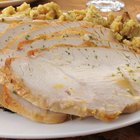
Busy days, changing plans or hectic holidays make it easy to forget that you have meat or poultry still in the refrigerator after a few days. Raw animal foods are especially susceptible to bacterial growth. Refrigeration only slows down the growth; it does not stop it. Your nose is often the best detector of spoiled food, and the short answer to whether you should cook a smelly turkey is: "No."
Odor, Appearance and Touch
Raw turkey -- or raw meat of any kind -- does have a slight odor, but the smell of meat that has gone rancid is quite unpleasant. By the time you can smell it, the bird is already bad and you should throw it out. Similarly, the turkey's appearance can also give you a clue as to whether it is spoiled. The skin on raw turkey is normally off-white to cream-colored. Beneath, it can range from lavender blue to pink. Spoilage may cause fading or darkening of color, and the meat may feel sticky or slimy to touch. Any of these are signs that the turkey is not safe to eat.
Avoid Cross-Contamination
When taking the turkey out of the refrigerator, spoiled or not, take care not to contaminate any other food in the refrigerator by letting the juices drip on shelves, food or containers. Immediately wash shelves and countertops with hot, soapy water if the juices drip on them. If they drip on a closed container, wash it off with hot, soapy water and transfer the food to a clean container. If the juices drip on any food not in a sealed bag or container, throw it out.
Storing Fresh Turkey
A fresh turkey will keep in the refrigerator for one to two days at 40 degrees. When shopping for a fresh turkey, or any poultry, pick it up right before checkout -- do not leave it unrefrigerated for more than 30 minutes. Do not leave the turkey in your car while you run other errands. Put it in the refrigerator immediately when you get home, and cook or freeze it within one to two days.
Frozen/Thawed Turkey
A turkey will keep up to one year in a freezer at zero degrees. Thaw the turkey in the refrigerator for one to three days, usually about 24 hours per 4 to 5 pounds. Thawing in the refrigerator is optimal, but you also can thaw it in cold water for 30 minutes per pound. Never thaw a turkey at room temperature. Large meats do not thaw evenly, causing bacteria to multiply on the outside while your turkey is still defrosting on the inside. Once you thaw the turkey, treat it as fresh -- you will be able to keep it in the refrigerator for one to two more days before you must cook it.
Related Articles
Is It Safe to Leave a Turkey at Room ...

How to Cook a Wild Turkey

How Long Can Raw Meat Sit Out?
Can You Cook a Turkey Halfway & Finish ...

How Long Does It Take for Ground Beef ...

Can You Cook Meat Gone Bad?

Fresh Homemade Orange Juice Will Stay ...

How to Roast Turkey in a Crock Pot

How Long Can Meat Stay out of the ...

How to Reheat Sliced Turkey

How to Defrost a Turkey

How Long Does It Take for Pork to Spoil ...

How to Know if Bacon Has Gone Bad

If Chicken Smells Bad Can You Still ...

How to Cook a Turkey From Frozen

What Does It Mean When Hamburger Smells ...
The Best Way to Cook a Honeysuckle ...

Is Frozen Ground Beef Left out for 3 ...

Can I Cook a Whole Chicken Without ...

How to Soak Chicken in Cold Water
References
- South Carolina Department of Health and Environmental Control: Prepare Meat, Eggs and Fish Safely
- FoodSafety.gov: Meat in the Refrigerator -- How Long Does It Last?
- U.S. Department of Agriculture: Food Safety and Inspection Service -- Poultry Preparation
- U.S. Department of Agriculture: Food Safety and Inspection Service -- The Color of Meat and Poultry
- U.S. Department of Agriculture: Food Safety and Inspection Service -- Safe Food Handling
- San Bernardino County: Department of Health -- Handling and Storing Chicken and Turkey Safely
Resources
Writer Bio
Based in Arizona, Kira Jaines writes health/fitness and travel articles, volunteers with Learning Ally and travels throughout the Southwest. She has more than 16 years of experience in transcribing and editing medical reports. Jaines holds a Bachelor of Arts in telecommunications and journalism from Northern Arizona University.
Photo Credits
Zedcor Wholly Owned/PhotoObjects.net/Getty Images